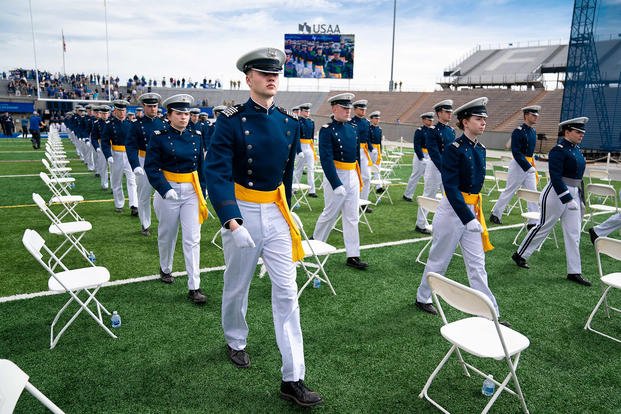The military service academies are all following the spirit of a nearly one-year-old law that allows cadets and Midshipmen who have children while enrolled to continue their education, even though the Pentagon is nearly a year behind schedule on releasing a formal policy.
A Department of Defense official told Military.com that the formal written policy enabling cadets or Midshipmen to retain parental guardianship while attending an academy "will be published soon." The Candidates Afforded Dignity, Equality and Training legislation, known as the CADET Act, was passed by Congress in December 2021 and gave the Pentagon a year to codify the changes.
"The CADET Act is a complex issue which required several policy and legal reviews and decisions," said the official, who spoke on background. The complexities of the rule change have required an "intensive and longer-than-anticipated" collaboration with the military services.
Read Next: Marines Begin Training in the Philippines as South China Sea Tensions Seethe
As the Pentagon continues to lag on the formal Department of Defense Instruction, called DoDI, the official said that the Air Force Academy, U.S. Military Academy and Naval Academy are all following the spirit of the CADET Act in the meantime.
"When, and if, presented with a cadet or Midshipman who states they are a parent or parent-to-be, the service academies consider each case on an individual basis, consult with their service leadership, and keep the best interest of the cadets and Midshipmen at the forefront," the official said.
The Air Force Academy was the first to adopt its own internal rules to honor the spirit of the CADET Act and immediately assisted four of its cadets who had submitted family care plans to leadership. The plans detail "who will care for the child financially and physically while the cadet remains enrolled at the academy," the school told Military.com in March.
Neither the Coast Guard Academy nor the Merchant Marine Academy are controlled by the Department of Defense Instruction. The law passed as part of the 2022 National Defense Authorization Act, or NDAA, pertains to the Air Force, Army and Navy academies.
The Coast Guard Academy public affairs office told Military.com in an email Wednesday that it is also "following the spirit of the CADET Act while awaiting promulgation of a formal policy."
The Merchant Marine Academy did not respond to Military.com's inquiry by the time of publication.
According to the text of the CADET Act, which was introduced by Sen. Ted Cruz, R-Texas, and Sen. Kirsten Gillibrand, D-N.Y., and inspired the policy revision in the 2022 NDAA, cadets would be able to create a family care plan and appoint a temporary guardian for the child to continue their studies -- a move that can be reversed following graduation from the academy.
The current Defense Department Instruction 1322.22 says that having a dependent, defined as "any person for whom an individual has a legally recognized obligation to provide support including but not limited to spouse and natural, adoptive, or stepchildren," is grounds for separation.
In the past, cadets admitting to either procreating or giving birth to children would be in violation of their service academy's rules, could be kicked out, and might be on the hook to pay back the cost of their education.
Other previous options included terminating a pregnancy or relinquishing custody of the child entirely, alternatives that affected women far more than men.
-- Thomas Novelly can be reached at thomas.novelly@military.com. Follow him on X @TomNovelly.
Related: Academy Cadets with Kids Still Waiting as Pentagon Lags on Rule Change














